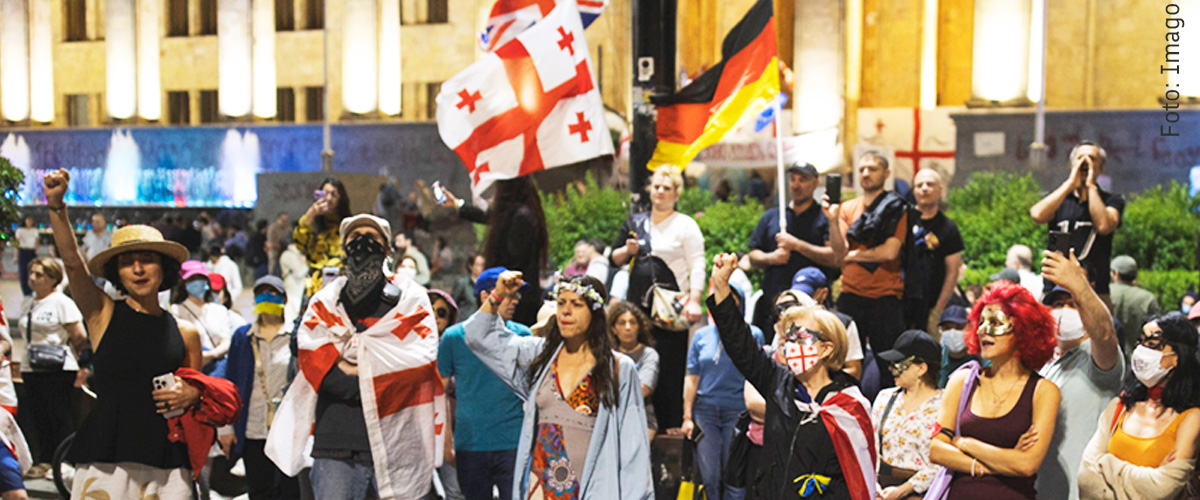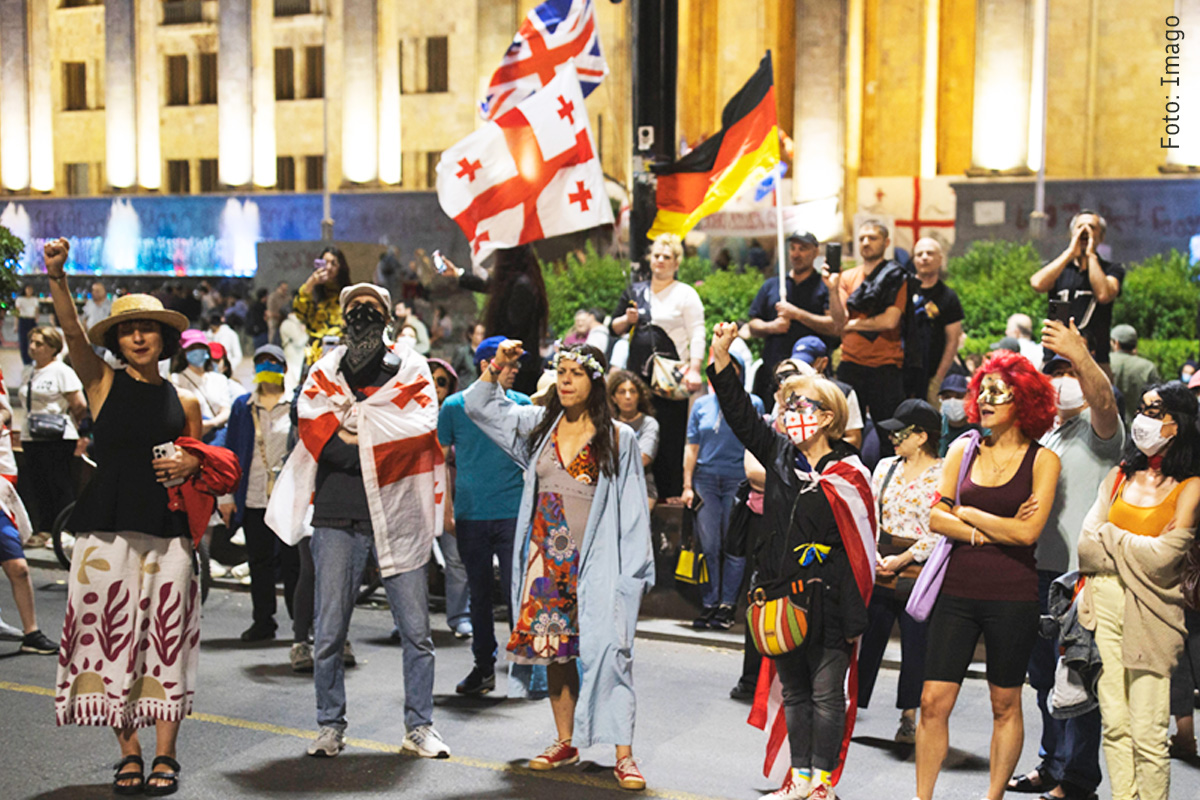Germany must act: An appeal from Georgia

Germany is paralyzing itself. This is particularly evident in its foreign policy toward Georgia. We seem to be far from a turning point. This must change urgently, not least so that Germany takes itself, its democratic values, and its partners seriously! An appeal from Tbilisi by Hans Gutbrod.
For over a year, Georgia’s fledgling democratic structures and achievements have been hollowed out and destroyed at an ever-increasing pace. Thanks to massive electoral fraud, the ruling Georgian Dream party secured a parliamentary majority once again in the fall of 2024. Since then, it has been pursuing a relentless policy of repression against the population, following Russia’s example. And Europe? And Germany? Instead of taking a clear stand and consistently threatening and imposing sanctions, Germany has been allowing itself to be bossed around by Viktor Orbán’s Hungary for months. So far, the message from Berlin has been that it only wants to take important political decisions regarding Georgia within and with the European Union. However, Orbán is blocking any steps within the EU that could stop Georgian Dream’s repressive course against its own people.
Arrests, enforced conformity, use of force...
In Georgia, most of the leaders of the opposition parties that ran against Georgian Dream in October 2024 have now been sentenced to prison terms on flimsy grounds. The regime has passed more than a dozen laws to bring civil society and independent media into line. Criticism of the regime on social media is now threatened with prosecution. Hundreds of citizens have been mistreated by the police – yet not a single one of these cases has been investigated so far. Instead, police officers who acted particularly violently and mercilessly against the people have been awarded medals. And the repression no longer affects only Georgian citizens: recently, a German journalist was fined over EUR 1,500 for reporting on the peaceful demonstrations in front of the parliament, which have been going on for 200 days. The Georgian perpetrators know exactly what they are doing. Both the prime minister and the speaker of parliament, the head of state security, and key figures in the Georgian judiciary have –believe it or not – earned law degrees in Germany.
...remain without consequences
And what is Germany’s response to all this repression? It remains modest. Berlin has stopped direct funding to the Georgian government and is avoiding contact with regime representatives. Otherwise, however, the response in recent months has been limited to entry bans against those particularly brutal police officers – nine in total. That is all that can be done, according to people in Berlin who deal with Georgia.
And it is precisely because of the lack of international response that the “Georgian Dream,” which now acts as a regime, is becoming increasingly self-confident and brazen. Almost every week, the German ambassador, Peter Fischer, is vilified by leading regime politicians. Consequences? None so far.
But why is German foreign policy so paralyzed? Political scientist Philip Manow identifies the “juridification of politics” as the central cause of the sclerosis of democratic systems that can be observed in virtually all areas of politics. Germany seems to have paralyzed itself with this juridification.
Clear statements from Ambassador Peter Fischer
Yet there is no lack of awareness of the dramatic situation. German Ambassador Fischer regularly speaks out clearly and is respected in Georgia, including by his fellow ambassadors, for his upright stance.
However, there is a lack of clear response from Berlin, while leading members of the Georgian Dream party stage their international trips on Instagram to show that Europe remains open to them. A young man is enjoying his scholarship from the German Academic Exchange Service (DAAD), which has allowed him to live in Heidelberg for years – despite the fact that his father, who earned his doctorate in Germany, was most recently the presiding judge of the Constitutional Court and is now deputy justice minister, playing a leading role in dismantling democracy in Georgia. (And, incidentally, the owner of a villa in a chic suburb above Tbilisi.)
Particularly noteworthy is the case of Goga Kikilashvili, a member of the so-called judges’ clan, a legal cabal in Georgia. This summer, he received a DAAD scholarship for a research stay in Regensburg – despite his activities in the High Council of Justice, a hub for judicial manipulation. Kikilashvili had simply omitted this part of his biography in his application, thereby withholding essential information from the selection committee. When asked about this, DAAD President Joybrato Mukherjee replied that the organization remains committed to the “principle of neutrality.” The assessment of the completeness of the documents was left to the applicant: “Against this background, the DAAD – despite all understandable reservations about Mr. Kikilashivili’s role as a member of the Georgian High Council of Justice – sees no grounds for revoking the scholarship.”
Democracies prove incapable of defending their values
The opaque network of guidelines and self-imposed rules thus even secures Georgian perpetrators’ entitlement to German funding. German taxpayers are currently continuing to support an exchange program that is firmly in the hands of the regime’s clique on the Georgian side. And although the problem is known to the DAAD and also to the president of Humboldt University in Berlin, Julia von Blumenthal, nothing is happening. These cases send out an immense signal that goes far beyond these incidents and makes it unmistakably clear to the regimes how incapable democracies are of defending their own values.
History teaches us that authoritarian politicians must be confronted with power and determination. But this is precisely what Germany finds so difficult to do. Meanwhile, the three Baltic states of Estonia, Latvia, and Lithuania are showing how perpetrators can be quickly banned from traveling. Germany must follow their example: anyone associated with the perpetrators should not be entitled to German support. Invoking supposed “neutrality” in this context is tantamount to declaring one’s own impotence. The legal departments of German authorities must implement their own political guidelines instead of continuing to undermine them.
The maxim must be that those who stand up against injustice receive support – both in Georgia and in exile. So far, however, there has been little sign of courageous support. Instead, honest Georgian lawyers had their funding from the German Ministry of Justice cut a month ago.
Germany must provide clarity
Germany must extricate itself from this mess. So far, there has been a huge gap between its own claims and reality. If Germany wants to be taken seriously, it must be able to act without allowing itself to be paralyzed by Orbán and his authoritarian cronies. However, it seems that those within the German apparatus can no longer even imagine winning a confrontation. It is trapped in the self-imposed constraints of entrenched administrative procedures. To escape this, a re-politicization of action is a necessary step. The new federal government will have to create a suitable framework for this.
Little Georgia has unexpectedly become a compelling test case for whether Germany is even capable of pursuing its own policy in a more dangerous world. The time without opposition is over. Now it is necessary to be able to assert oneself—and to want to do so. So far, the results have been modest.
Hat Ihnen unser Beitrag gefallen? Dann spenden Sie doch einfach und bequem über unser Spendentool. Sie unterstützen damit die publizistische Arbeit von LibMod. Wir sind als gemeinnützig anerkannt, entsprechend sind Spenden steuerlich absetzbar. Für eine Spendenbescheinigung (nötig bei einem Betrag über 200 EUR), senden Sie Ihre Adressdaten bitte an finanzen@libmod.de
Verwandte Themen
Newsletter bestellen
Mit dem LibMod-Newsletter erhalten Sie regelmäßig Neuigkeiten zu unseren Themen in Ihr Postfach.





